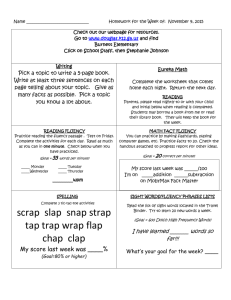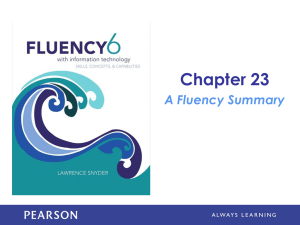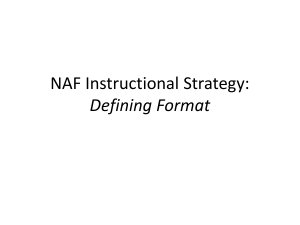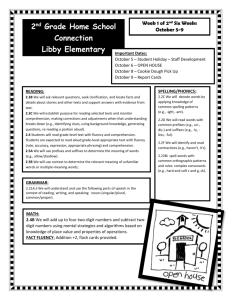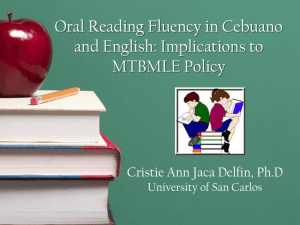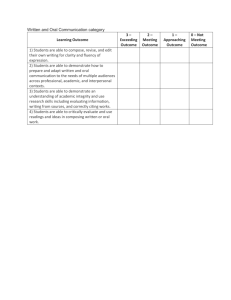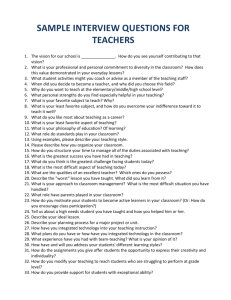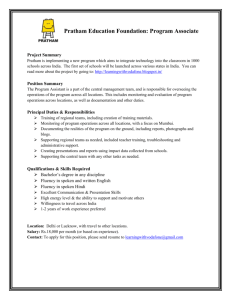Draft Research Proposal Week 4 Version
advertisement
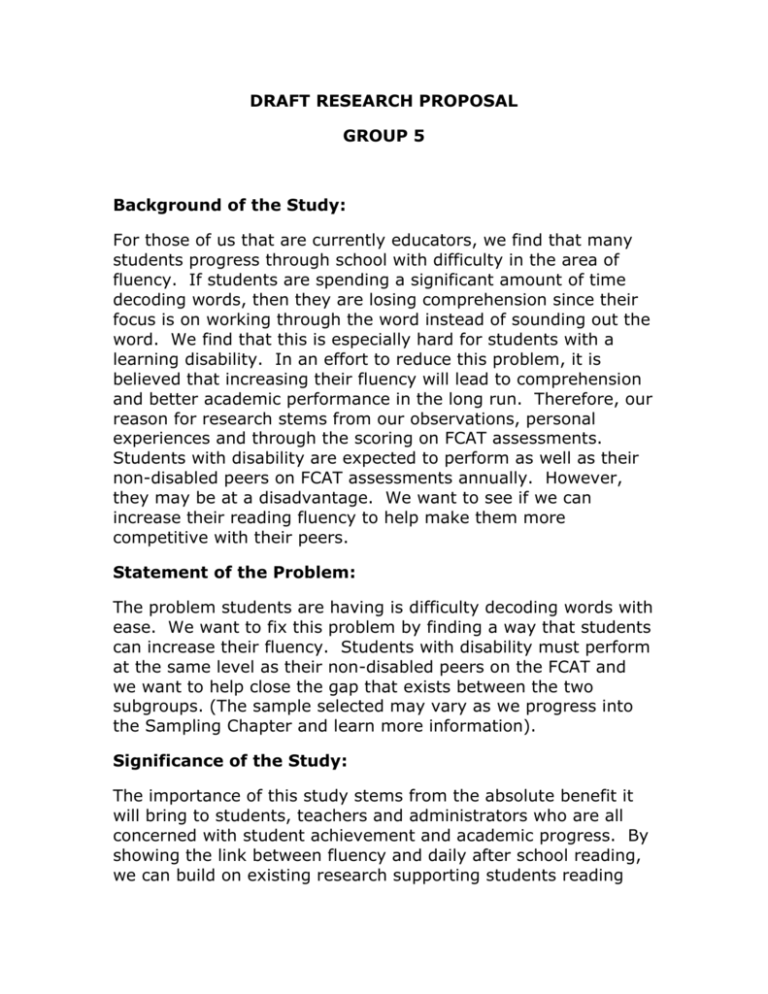
DRAFT RESEARCH PROPOSAL GROUP 5 Background of the Study: For those of us that are currently educators, we find that many students progress through school with difficulty in the area of fluency. If students are spending a significant amount of time decoding words, then they are losing comprehension since their focus is on working through the word instead of sounding out the word. We find that this is especially hard for students with a learning disability. In an effort to reduce this problem, it is believed that increasing their fluency will lead to comprehension and better academic performance in the long run. Therefore, our reason for research stems from our observations, personal experiences and through the scoring on FCAT assessments. Students with disability are expected to perform as well as their non-disabled peers on FCAT assessments annually. However, they may be at a disadvantage. We want to see if we can increase their reading fluency to help make them more competitive with their peers. Statement of the Problem: The problem students are having is difficulty decoding words with ease. We want to fix this problem by finding a way that students can increase their fluency. Students with disability must perform at the same level as their non-disabled peers on the FCAT and we want to help close the gap that exists between the two subgroups. (The sample selected may vary as we progress into the Sampling Chapter and learn more information). Significance of the Study: The importance of this study stems from the absolute benefit it will bring to students, teachers and administrators who are all concerned with student achievement and academic progress. By showing the link between fluency and daily after school reading, we can build on existing research supporting students reading aloud at home and the impact on academic achievement in the school setting. Research Purpose: The purpose of this study is to examine the relationship between reading aloud and increased reading fluency. Specifically, this study aims to achieve two objectives: (a) to find out if reading aloud affects reading fluency, and (b) to see if this impact differs between disabled and non-disabled students. Research Questions: 1. Can students with varying exceptionalities increase their fluency by reading with a peer tutor, parent or reading coach aloud five days a week? 2. How does the amount of time (0, 15, 20 minutes) spent reading aloud 5 days per week impact fluency? 3. Can students with varying exceptionalities benefit in the same way from reading aloud as their non-disabled peers? (The sample selected may vary as we progress into the Sampling Chapter and learn more information). Statistical Hypothesis: Will reading aloud for either 0, 15 or 20 minutes nightly, 5 days a week significantly improve a student's fluency for students with a specific learning disability, including autism to a measurable and significant level? This is a DIRECTIONAL HYPOTHESIS. Variables: 1. Scores on similar/related, pre-selected FCAT passages (quantitative). 2. Rate of words correct per minute over time (continuous) 3. Time increments will be 0, 15, and 20 minutes based on which group the students are placed in (independent) 4. Specific Learning Disorder type or non-disabled students (dependent) 5. Frequency of time each night varies (manipulated) 6. SLD (controlled) Prediction: The more time that is spent reading, the fluency rate will increase. We predict that there would be a significant change in fluency rate from a student who reads 0 minutes to 20 minutes per night. We also might predict that a student who reads 15 minutes nightly would be closer to the student who read 20 minutes nightly. Which raises the question of: is the gap so close between reading 15 and 20 minutes, that students should just read 15 minutes per night and we have more success that they will do it. Literature Gaps: I found that there were several gaps in the literature surrounding our research question. Even though fluency has long been hailed as a necessary component to success in all academic areas, it seems as though there are very few studies that are focused on remediation in this area or activities in this area. Most reading programs explore other areas of interest and seem to exclude the best practices for increasing fluency. It would follow that reading aloud impacts fluency. Fluency is not an internal process, but one that involves reading out loud in an audible voice. While I found articles on reading aloud, I could not find any where reading aloud at home was linked to increased fluency. My main question stems from – what is the benefit of reading aloud nightly (as most educators ask their students to do) if there’s no one there to fix their mistakes? Will they actually benefit or will they be ingraining their reading mistakes further by not be corrected and simply allowed to continue making the mistake. The literature gap specifically related to this article and our research proposal is that specific data has not yet been identified or located to confirm that students with varying exceptionalities such as Autism, or specific learning disabilities will be able to sustain nightly readings or comprehend what they may be reading nightly. Additional research evaluations could be performed in these areas to determine the ability of these students to consistently remain focused and read nightly at the rates proposed in our research proposal. If the exceptionalities of these sample populations prevents a successful completion of the research it will be unclear if nightly readings can impact classroom fluency assessments for students with varying exceptionalities as identified. The literature gap related to this article and our research questions is that a changing criterion design was used in the study that involved contingent rewards. The results show that the student’s fluency improved overtime as long as the reward was present. The question is whether or not the student the student’s fluency problem had some behavioral relation. Our research proposal questions if student with disability, including those with Autism, are given the opportunity to read aloud with a peer, parent, or tutor for various period of times will this improve their fluency. Building on Previous Research: This research will document the impact of consistent nightly reading. In our research, we will be measuring students reading at varying amounts of time nightly and determining the impact on fluency rate. By reviewing our research results in conjunction with the cited research, hypothetical conclusions may be formulated to predict the potential impact of sustained nightly reading at timed intervals on the ability to read varying (higher and lower) reading passages in a classroom setting. In other words, as part of additional and separate research, we could see if there is a correlation between our sample students who read 20 minutes per night being able to more quickly reach and sustain the higher level reading passage that is tested in the classroom in the cited article. Also related, research has been done in order to find an instructional techniques that will improve teaching beginning reading. Studies have shown that fluency is a direct connection between decoding words and comprehension. Repeated reading is a strategy to increase fluency and strengthen areas of decoding and comprehension. References Submitted by A. Prince Kubina, R., Amato, J., Schwilk, C. L., & Therrien, W. J. (2008). Comparing Performance Standards on the Retention of Words Read Correctly per Minute. Journal of Behavioral Education, 17(4), 328-338. Retrieved from EBSCO host. References Submitted by D. Dillenseger: Bruns D, Pierce C. Let's Read Together: Tools for Early Literacy Development for All Young Children. Young Exceptional Children [serial online]. January 1, 2007;10(2):2-10. Available from: ERIC, Ipswich, MA. Accessed September 14, 2011. Marr, M., Algozzine, B., Nicholson, K., & Dugan, K. (2011). Building Oral Reading Fluency with Peer Coaching. Remedial and Special Education, 32(3), 256-264. Retrieved from EBSCOhost. References Submitted by C. Smith: Fienup, D. M., & Doepke, K. (2008). Evaluation of a Changing Criterion Intervention to Increase Fluent Responding with an Elementary Age Student with Autism. International Journal of Behavioral Consultation and Therapy, 4(3), 297-303. Retrieved from EBSCOhost. References Submitted by G. Mahon:
